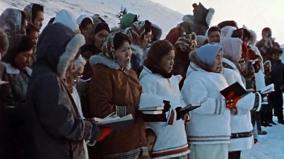New release
Coming
None
 Qallunaat! Why White People Are Funny
Qallunaat! Why White People Are Funny
2006
52 min
Leaving soon
This documentary pokes fun at the ways in which Inuit people have been treated as “exotic” documentary subjects by turning the lens onto the strange behaviours of Qallunaat (the Inuit word for white people). The term refers less to skin colour than to a certain state of mind: Qallunaat greet each other with inane salutations, repress natural bodily functions, complain about being cold, and want to dominate the world. Their odd dating habits, unsuccessful attempts at Arctic exploration, overbearing bureaucrats and police, and obsession with owning property are curious indeed.A collaboration between filmmaker Mark Sandiford and Inuit writer and satirist …

Details
This documentary pokes fun at the ways in which Inuit people have been treated as “exotic” documentary subjects by turning the lens onto the strange behaviours of Qallunaat (the Inuit word for white people). The term refers less to skin colour than to a certain state of mind: Qallunaat greet each other with inane salutations, repress natural bodily functions, complain about being cold, and want to dominate the world. Their odd dating habits, unsuccessful attempts at Arctic exploration, overbearing bureaucrats and police, and obsession with owning property are curious indeed.
A collaboration between filmmaker Mark Sandiford and Inuit writer and satirist Zebedee Nungak, Qallunaat! brings the documentary form to an unexpected place in which oppression, history, and comedy collide.
A collaboration between filmmaker Mark Sandiford and Inuit writer and satirist Zebedee Nungak, Qallunaat! brings the documentary form to an unexpected place in which oppression, history, and comedy collide.
-
writerMark Sandiford
-
directorMark Sandiford
-
collaborating directorZebedee Nungak
-
producerMark SandifordKent Martin
-
director of photographyGary Elmer
-
assistant cameraHenry Naulaq
-
production soundDavid Poisey
-
editorChristopher Cooper
-
content consultantZebedee Nungak
-
additional content consultantLena Ellsworth
-
segment directorLena Ellsworth
-
story consultantJohn Kastner
-
line producerSean Yeomans
-
production coordinatorNadia Bouffard
-
production assistantSula Enuaraq
-
location graphicsMelanie HoudeTony Romito
-
original music composerAsif Illyas
-
researcherElizabeth Klinck
-
post-productionPower Post
-
post supervisorSara Thomas
-
online editorDoug Woods
-
colouristDoug Woods
-
assistant on-line editorChris MacIntosh
-
re-recording mixerBrian Power
-
sound effects designerEva Madden
-
foley artistKen MacCaull
-
foley recordistDan Wagner
-
dialogue editorGraham Colwell
-
centre administratorJohn William Lutz
-
production supervisorPatricia Coughran
-
marketing managerAmy Stewart Gallant
-
production executiveRobin Johnston
-
vice president of documentariesBob Culbert
-
interviewsJohn AmagoalikLori IdloutAlexina KubluZebedee NungakJeff Tabvahtah
Education
Ages 15 to 17
Study Guide
School subjects
Discuss the adage, “turnabout is fair play.” How does this statement reflect the premise of the film? What things about the white man’s culture do the Inuit find peculiar? What are the inherent dangers of forcing one’s culture and traditions on another? Discuss the educational value of this film.

















